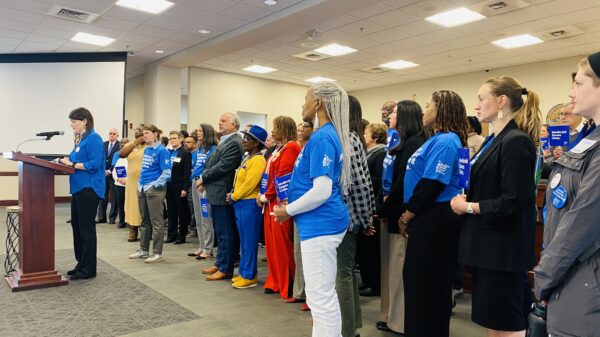By Brandon Moseley
Alabama Political Reporter
In a Wednesday afternoon session, the Alabama House of Representatives passed the Fiscal Year 2015 General Fund budget, House Bill 235, which goes into place on October 1.
Because of Alabama’s archaic budgeting practices, education has its own separate budget, with monies earmarked by the Alabama Constitution for both budgets. Matters unrelated to education are addressed in the General Fund. Most growth revenue is in the Education Trust Fund budget. The General Fund includes such things as: transportation, the Dept. of Corrections, State Law Enforcement, the Alabama Court System, the Legislature, the Governor’s office, and Alabama Medicaid.
The House Republican Caucus wrote on Facebook, “Today, members of the House passed the State’s proposed $1.8 billion General Fund Budget with a vote of 80-20. Unlike the federal government, here in Alabama we’re living within our means and using taxpayer dollars as efficiently as possible without raising a single dime in taxes.”
The budget has been stressed over recent years because the State is required by Federal law to provide a minimum level of Medicaid services in order to receive the Federal match, which is 65% of the total Medicaid outlay. Unfortunately the cost of Medicaid is growing much faster than State revenues due to increasing healthcare costs, an aging population and a jobless recovery that has resulted in more Americans either dropping out of the work force or accepting low-wage parttime jobs.
The budget, HB 235, is sponsored by House Ways & Means General Fund Committee Chairman Steve Clouse (R) from Ozark and Chairman Clouse presented the budget as well as additions and amendments from the Committee on the House floor.
Representative Mack Butler (R) from Rainbow City said on Facebook, “In 2003 Medicaid only consumed 18 percent of our budget, and in 2014 consumed 35 percent of our budget. Makes no sense that with all the increase in spending on health, and all the advances in medicine that disability claims are still skyrocketing. It would make sense that the disability claims would drop.”
The Fiscal Year 2015 budget passed by the House appropriates $685,125,607 to the Medicaid Agency of Alabama. That is an increase of $70 million from FY 2014.
Chairman Clouse said that Medicaid is difficult to budget because the amount spent is not capped. It is based instead on the amount of claims that come in from the people who receive Medicaid benefits.
Rep. Butler said, “Most State agencies are getting level funding with the exception of a few. Medicaid is seeing an increase of 70 million, Dept. of Public Health for Children’s Health insurance will get an increase of 10.5 million. Unified Judicial System will get an increase of 5 million. Forensic Sciences will see an increase of 1.5 million to deal with their case backlog. ADECA will see an increase of 150,000 for Military Stabilization Committee to assist with BRAC prep. Dept. of Public Health will get an increase of 47,500 for Kidney Foundation dialysis patient transportation and 55,600 increase for breast and cervical cancer early detection programs.”
The biggest concern many critics have with the budget is the proposed funding for the Alabama Corrections system. The U.S. Department of Justice has already declared that the conditions at the Tutwiler facility for women are unconstitutional.
Many had expected that the Corrections Department would receive a substantial increase in funding for the Alabama prisons. Instead of alleviating the budget shortfall at Corrections, the House General Fund budget actually cuts their appropriation by $6,802,898 from FY 2014.
Rep. John Knight (D) from Montgomery said on the House floor, “There is a serious problem with Corrections.” Knight said the prison need enough people on staff to be safe. “If you have relatives employed by the Corrections Department in this State, you need to be concerned about them.”
The Alabama Judicial System was heavily impacted by proration during the Great Recession and by funding cuts in post recession state budgets. The House Ways & Means General Fund Committee allocated $112,982,845 to the courts, which is $162,064 less than Alabama Governor Robert Bentley requested, but $552,045 more than the courts were appropriated in the Fiscal Year 2014 budget.
State General Fund employees (this does not include teachers and other education employees because funding for their pay comes from the ETF) are hoping for a raise. There is no raise guaranteed in this budget, but it is a conditional appropriation based on State revenues.
Rep. Knight said, “When we drive home in a storm, when we leave this chamber, we rely on our State employees to protect us when we go and get services we rely on our State employees to provide them. When emergencies happen we rely on our State employees. It is unfortunate that we are getting to the point that many of them are having to get second and third jobs to make ends meet and they are having to do extra work.”
Refinancing outstanding state debts is expected to save the State $430,137 in debt service costs in FY 2015 versus the FY 2014 budget. Total debt service in FY 2015 is projected at $28,398,142.
Rep. Patricia Todd (D) from Birmingham said, “We have got to deal with revenue.” Bond service is $28 million and total Bond debt is over $4 billion. “We need to figure out how to raise the revenue we need…I am not going to vote for this budget.” Todd said that the budget does nothing to eliminate poverty or decrease the State’s bond indebtedness.
The total projected General Fund budget is $1,823,969,513 which is an increase of $1,787,513 over what the Governor’s office had projected.
Rep. Pebblin Warren (D) from Tuskegee said, “These are troubled times in the State of Alabama. These are hard times. Now we just have to cut, cut, cut. I can not understand how with a budget like this we can turn our backs on gambling. We got to be realistic and look at how much money is going into gaming in other states we can not continue to ignore the biggest revenue pots.” The Bureau of Indian Affairs reports that the Poarch Creek have generated more gaming than any other Indian gaming.”
Chairman Clouse said, “I was one of 11 Republicans who voted to put the lottery on the ballot and the people voted it down.”
Rep. Warren admitted, “We got a little crazy in the bill,” which was written when Democrats controlled both Houses of the legislature and Don Seigelman (D) was Governor. Warren said, “The doors are wide open for a gaming tax in Alabama…Right now we are supporting every state around us but the state of Alabama.”
Rep. Jim Patterson (R) said that one of the biggest problems in the budget is unfunded Cost of Living Adjustments (COLAs) for state retirees and underperformance of the Retirement Services of Alabama (RSA). While the last two years have been good the previous eight were not and because of it the State in both the General Fund and the ETF are having to fund the added costs of pensions for State retirees.
Patterson asked to add an informational amendment to the budget publicizing these facts for anyone who reads the Alabama General Fund Budget. Patterson said that unfunded COLAs and underperformance of the RSA Fund cost taxpayers $978 million in 2011 and is projected to cost another $934 million.




















































